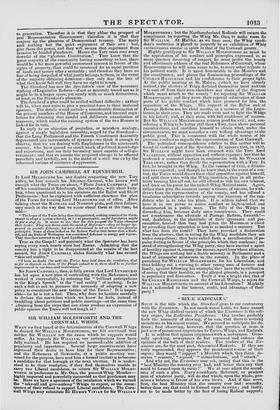SIR WILLIAM MOLESWORTH AND THE CORNWALL WHIGS.
WHEN we first heard of the determination of the Cornwall Whigs to discard Sir WILLIAM MOLESWORTH, we felt convinced that neither Sir WILetast nor the cause which he supports would suffer. As regards Sir WILLIAM, our anticipations have been fully realized. He has acquired no inconsiderable addition of popularity and importance. Several large constituencies have expressed their desire to have him for their Representative; and the Reformers of Newcastle, at a public meeting con- vened for the purpose, have sent him a formal invitation to become a candidate for that borough at the next election. It is under- stood to be their resolution, if they find themselves unable to carry two Liberal candidates, to return Sir WILLIAM MOLES- WORTH in preference to Mr. ORD, the present Whig Member— highly respected and powerfully connected as that gentleman may be. Here we have a specimen of the retaliation which we warned the "take-all and give-nothing" Whigs to expect, as the conse- quence of their refusal to support Liberal candidates. The Corn- wall Whigs may substitute Sir HUSSEY VIVIAN for Sir WILLIAM MOLESWORTH; but the Northumberland Radicals will return the compliment by rejecting the Whig Mr. ORD, to make room for Sir WILLIAM. At Halifax, as we have seen, the Whig candi- date's reelection is planed in jeopardy by an exhibition of Whig exclusiveness similar in spirit to that of the Cornwall gentry. Highly gratifying to Sir WILLIAM MOLESWORTH as must be the approbation of his conduct and principles expressed in so many quarters deserving of respect, he must prefer the hearty and affectionate address of the real Reformers of Cornwall, whose Representative he will soon cease to be, to every other tribute to his political worth. It is most honourable to the Member and the constituency, and places the domineering proceedings of Sir COLMAN RASHLEIGH and his confederates in their proper light. At the public meeting at St. Mabyn, (which we have already noticed,) the electors of Trigg declared themselves most anxious "to cast off from their own shoulders any share of the disgraoe which must attach to the county" for rejecting Sir WILLIAM MOLESWORTH; and they avow their especial admiration of those parts of his public conduct which have procured for him the opposition of the Whigs. His support of the Ballot and of Peerage Reform are his chief merits, as a member of the Legis- lature, in their eyes. They are ready even now to fight the Whigs in his behalf; and, as they state, with full confidence of success. But Sir WILLIAM MOLESWORTH returns good for evil; and, con- sidering a Whig to be better still than a Tory, rises above personal considerations, and sacrifices himself to obtain what, under the circumstances, we must consider a very trifling advantage to the public good. This is consistent with the whole course of his previous conduct as regards the representation of East Cornwall.
The published correspondence relative to this matter will be found in *mother part of the Spectator. It appears that, in 1832, Sir WILLIAM might have been returned with the Tory Lord VALLETORT, without opposition and without expense; but that he preferred a contested election in conjunction with Sir WILLIAM TRELAWNY, rather than divide the representation with a Tory. In fact, lie brought in the Whig. In the summer of 1835, a dissolu- tion was expected ; and though he knew that, in the event of a con- test, the Tories would direct their chief opposition against himself, and split their votes with the Whig candidate, thus in all proba- bility turning himself out, lie still offered to risk his own interest, and draw on his purse for theunited Whig-Radical cause. Again, rather than give the common enemy a chance of success, he with- draws from the representation of the county, and has offered a handsome subscription towards paying the expenses of the can- didate who is to take his place. It is seldom indeed that we have it in our power to notice conduct so high-minded and disinterested in a public man. The folly of the Whigs in discarding him, becomes daily more conspicuous. They could not countenance the advocate of Peerage Reform, forsooth!-- and, doubtless, in the plenitude of their ignorance and pre- sumption, fancied that they had given the Movement a eheck by recording their opposition to him in so marked a manner. But what has been the result? They have provoked a declaration from the electors, that in voting for the Whig candidate they act
under compulsion ; they have called forth a manifestation of po- pular feeling in favour of the principles which they condemn; in- stead of strengthening the Whig party, they have excited a spirit of hostility against it, among the masses, apart from whose alliance, the Whigs are nothing but a feeble minority in Parliament and a band of unpopular aristocrats in the country. In the place of
punishing Sir WILLIAM MOLESWORTH for his Liberalism, and thus holding out a warning to other young men of fortune and
family, against following his example, they have the mortification of seeing that their hostility, on the alleged grounds, is a passport to popularity and distinction. Truly it was a bright idea that of
Sir COLMAN RASHLEIGH and the Cornwall Whigs, to reject Sir WILLIAM MOLESWORTH on account of his Liberalism ! Mightily has it redounded to the honour, credit, and advantage of their party !


























 Previous page
Previous page